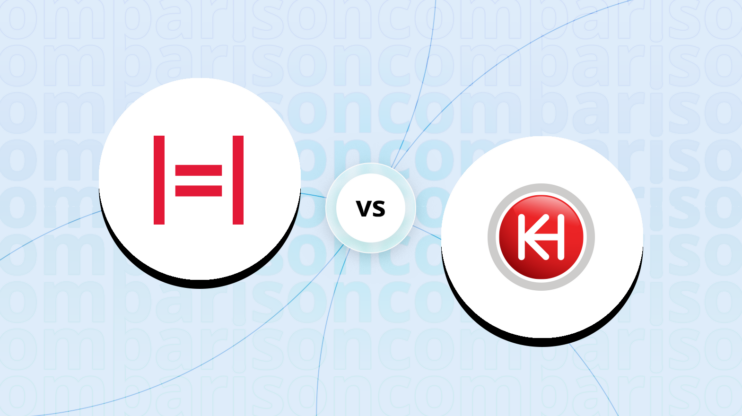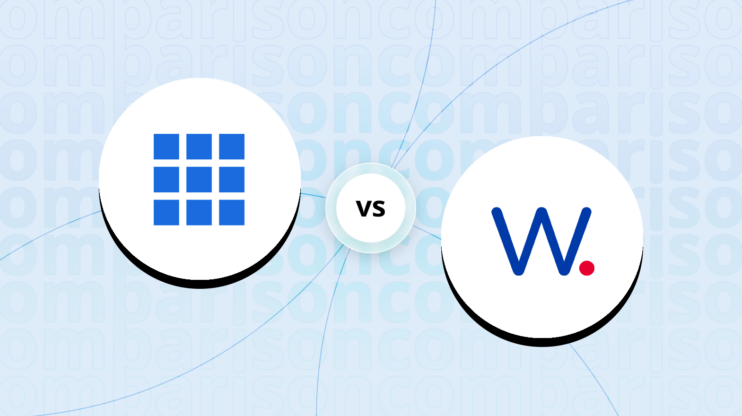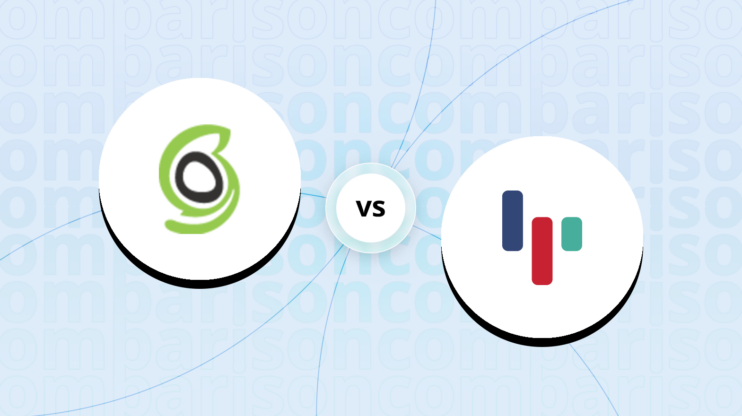Namecheap vs Rocket.net: Final verdict
Looking over Namecheap vs. Rocket.net, Rocket.net’s advanced features and superior performance make it a compelling choice for web hosting.
Rocket.net (Overall grade: 8.3)
stands out with impressive speed and performance metrics, thanks to its enterprise-level infrastructure and globally distributed edge locations. The notable 73-millisecond average response time and reliable 99% uptime guarantee provide a speedy and stable hosting environment. Features like pre-configured settings for WordPress, enterprise CDN, daily backups, and robust security measures such as real-time malware protection and automated updates add to its appeal. Additionally, Rocket.net’s 24/7/365 support via live chat, email, and phone ensures users have access to assistance whenever needed. Despite its higher price point, Rocket.net delivers a strong value for high-traffic sites, agencies, and performance-focused users.
Namecheap (Overall grade: 7.2)
provides a variety of cost-effective hosting plans, tailored to meet diverse user needs from shared to dedicated hosting. It includes user-friendly features like a built-in website builder, free SSL certificates for the first year, and consistent backups. With a 100% uptime guarantee on certain plans and an average response time of 1.05 seconds, Namecheap offers reliable service, though not as fast as Rocket.net. Its extensive email hosting services, two-factor authentication, and thorough customer support via live chat and ticket systems make it a viable choice for beginners and small businesses. However, it lacks some advanced performance and security features that Rocket.net offers, making it less suitable for demanding, high-traffic websites.
 Overall grade:7.2 |
 Overall grade:8.3 |
|
|---|---|---|
| Uptime and Availability | 8.0 | 8.6 |
| Hosting Performance | 8.2 | 9.1 |
| Hosting Security | 8.5 | 9.1 |
| Price | 8.7 | 8.3 |
| Hosting Features | 7.5 | 4.6 |
| Ease Of Setup | 8.8 | 9.1 |
| User Management | 0.0 | 8.5 |
| Customer Support | 8.0 | 9.2 |
| User feedback | 4.3/5 | 5/5 |
Hosting types offered
Both platforms provide a variety of hosting types, each designed to meet the different needs of users.
 |
 |
|
|---|---|---|
| Shared hosting | ||
| Cloud hosting | ||
| WordPress hosting | ||
| Ecommerce hosting | ||
| VPS hosting | ||
| Dedicated hosting |
Although both offer a variety of hosting plans tailored to different needs, in
certain cases, one platform may prove to be more suitable.
Detailed comparison
Uptime and availability
Evaluates the average uptime statistics, uptime guarantee and overall availability of the hosting
provider
Score Components:
- Uptime percentage (30%): evaluates the uptime statistics in given period of time
- Uptime guarantee (20%): Assesses if the platform offers an uptime guarantee and
whether the actual uptime matches the promised guarantee. - General performance (25%): Evaluates how fast is the average response time and overall
it’s stability. - Responsiveness (10%): Adaptability to different devices and screen sizes.
- Availability (25%): Reflects the total downtime and number of outages.
 8.0
8.0
 8.6
8.6
🏆 Winner
Rocket.net: Fast response times and extensive advanced features make Rocket.net a strong choice for hosting.

Rocket.net offers a 99% uptime guarantee and impressive average response times of 73 milliseconds, ensuring websites load quickly. Its global edge locations and enterprise-level features like CDN and WAF provide additional layers of security and speed. Free migrations, daily backups, and antivirus measures add to its reliability. The 24/7/365 support via live chat, email, and phone further enhances its service.

Namecheap, with its varied uptime guarantees and average response time of 1.05 seconds, performs well but not as consistently fast as Rocket.net. Its highest uptime guarantee is 100% for shared, business, and dedicated server accounts, though recent tests indicate some downtimes. Overall, Namecheap offers stable performance and convenient compensation for downtime issues, but it falls slightly short in response time metrics compared to Rocket.net.
Which one has better hosting performance?
Score Components:
- Hosting speed (30%): This includes SSD quality, Load times, PageSpeed score ranges,
additional information on website speed, built-in plugins for performance enhancement, available caching
methods, and CPU/RAM options - CDN (20%): Considers whether CDN is available or not, whether it’s free or paid, and
the quality of the CDN service - Available data centers (30%): Evaluates the number of data centers and their locations
globally. - Scalibility (20%): Looks at whether elastic scaling is available, the process required
to scale (manual upgrade vs. automatic scaling), the presence of dedicated servers, and the costs
associated with scaling.
 8.2
8.2
 9.1
9.1
🏆 Winner Rocket.net: Exceptional speed and WordPress optimization make Rocket.net the preferred choice for hosting.
Namecheap offers several hosting plans, including shared, WordPress, reseller, and VPS hosting, with a focus on affordability and eco-friendliness. Namecheap delivers solid performance with SSD storage, unmetered bandwidth, and free SSL certificates across all plans. The inclusion of a free CDN and consistent backups for most plans are notable. Rocket.net, on the other hand, leverages a globally distributed network of 275+ edge locations, pre-configured for maximum speed. It showcases superior load times, low Time to First Byte (TTFB), and enterprise CDN and WAF. Namecheap’s datacenters are located in the US, UK, and EU, while Rocket.net boasts a more expansive reach.
Website Speed
Rocket.net excels in website speed, thanks to its enterprise NVMe servers, PHP 8.0, and pre-configured settings optimized for WordPress. Namecheap performs decently with SSD storage and a fully loaded time of 0.7 seconds for its EasyWP plan. However, Rocket.net’s overall performance metrics, like TTFB of approximately 83ms and cache hit ratio of 96.21%, demonstrate a clear edge over Namecheap. The customer testimonials also support Rocket.net’s superior speed improvements.
Scalability
Namecheap offers various upgrade paths across shared, VPS, and reseller hosting plans, though it requires manual upgrades. It doesn’t have dedicated servers, and there is limited information on the cost of scaling. Rocket.net, with its enterprise CDN and integrations, allows seamless scaling, particularly for WordPress sites. Specific details on automatic scaling and dedicated servers for Rocket.net aren’t provided, but its infrastructure suggests easy adjustments to handle growing traffic demands.
Which one has better security features?
and regulatory requirements
Score Components:
- Technical security measures (40%): This includes encryption, firewalls, DDoS
protection, secure configurations, server monitoring, access control and availability of security addons
(e.g Sitelock security). - Operational security measures (30%): Encompasses data privacy, backups and data
redundancy. - Compliance and certifications (20%): Adherence to legal and regulatory requirements
(e.g., GDPR, HIPAA) and possession of certifications (e.g., ISO 27001, SOC 2). - Business and reliability (10%): Factors in the provider’s reputation, uptime
guarantees, and customer support.
 8.5
8.5
 9.1
9.1
🏆 Winner Rocket.net: Offering extensive real-time malware protection, proactive fraud defenses, and automatic updates, Rocket.net ensures a highly secure hosting environment.
Both Namecheap and Rocket.net, have notable differences in their approaches to technical and operational security, as well as in their compliance with regulations.
Technical security measures:
Namecheap offers a robust set of technical security features, including support for PHP versions ranging from 5.X to 8.X, ClamAV™ virus scanning, and encryption options like PGP/GPG and SSL certificates for various levels of domain validation. Rocket.net matches these with support for multiple PHP versions from 5.6 to 8.3 and emphasizes real-time malware protection powered by Imunify360, along with automated updates to WordPress core, plugins, and themes. Rocket.net also stands out with its Enterprise Web Application Firewall (WAF) that proactively scans every request.
Operational security measures:
Namecheap enhances operational security with features like two-factor authentication (2FA), domain privacy, and FastVPN for secure browsing on public Wi-Fi. Additionally, it has tools like Hotlink Protection, IP Deny Manager, and the IP blocker to provide multiple protection layers. Rocket.net counters with always-on protection, including brute force defense, weak password prevention, and automated bot protection. The automated daily backups with retention periods ranging from 14 to 30 days further bolster Rocket.net’s operational security.
Compliance and certifications:
Both Namecheap and Rocket.net comply with GDPR, ensuring user rights such as data access, rectification, and portability. Namecheap doesn’t specify PCI or HIPAA compliance, while Rocket.net meets PCI compliance requirements, making it a suitable choice for handling credit card data securely. HIPAA compliance is not specified for either hosting provider.
 |
 |
|
|---|---|---|
SSL certificate |
Multiple types (DV, OV, EV, etc.) |
Unlimited free SSL |
Additional security features |
Jellyfish Spam Protection, BoxTrapper, etc. |
Real-time malware protection, brute force protection |
PHP versions |
PHP 5.X to PHP 8.X |
PHP 5.6 to PHP 8.3 |
GDPR compliance |
Yes |
Yes |
HIPAA compliance |
Not specified |
Not specified |
PCI compliance |
Not specified |
Yes |
Hosting features
Score Components:
- Domains (20%): Assesses the availability of a free domain, domain purchase options, and
pricing - Email (15%): Considers if the provider offers full email hosting, or is reselling
third-party service, and if the email is only transactional or not - Website builder (15%): Checks if website builder is available, and it’s user
friendliness and overall the level of customization allowed. - Staging environment (20%): Determines if a staging environment is available, allowing
for testing changes before going live. - FTP & SFTP accounts (10%): Evaluates if and how easily users can access FTP and
SFTP accounts - Git and SSH access (20%): Assess whether Git is integrated into the hosting service and
if SSH access is provided
 7.5
7.5
 4.6
4.6
🏆 Winner Namecheap: Namecheap offers comprehensive and affordable hosting plans suitable for various types of users.
Both Namecheap and Rocket.net bring different advantages to the table. Namecheap provides a plethora of features such as a built-in website builder with all its plans, making it user-friendly even for beginners. The inclusion of tools like WordPress and cPanel ensures that users have complete control over their websites, and the Softaculous app installer greatly simplifies the setup process. Conversely, Rocket.net emphasizes advanced security features and management tools, including one-click staging and SSH access, making it ideal for developers and tech-savvy users. Both services offer free SSL certificates, but Namecheap includes 50 free PositiveSSL certificates for the first year, adding significant value.
Namecheap shines with its cost-effective plans and a free Supersonic CDN. It also offers a robust set of email hosting features and an AutoBackup option, which is included in higher-tier plans. Rocket.net’s standout features include a secure file manager, enterprise edge CDN, and comprehensive site-level user access, including unlimited users and brute-force protection. While Namecheap has a wide range of plans suitable for various needs, Rocket.net’s offerings are geared more towards performance-focused users requiring advanced management capabilities.
 |
 |
|
|---|---|---|
Free domain |
No |
No |
Free SSL |
Yes, for the first year |
Yes |
Email hosting |
Yes |
No |
Website builder |
Yes |
No |
Staging environment |
No |
Yes |
FTP & SFTP accounts |
Yes |
Yes |
Git and SSH access |
Yes |
Yes |
Free backup |
Yes, for some plans |
No |
Money back guarantee |
Yes, 30 days |
No |
a location.
As a result in rare cases the features mentioned here can differ from the ones you see on their websites.
Both providers support a range of users from beginners to experts with user-friendly website builders and WordPress staging areas. However, in terms of developer tools, both Namecheap and Rocket.net offer robust options including SSH access, support for multiple programming languages, and Git for version control, thus appealing to developers looking for advanced capabilities.
Email Services:
Namecheap offers extensive email features, including domain-based email addresses, unlimited email forwarders, and autoresponders. Their hosting plans come with 30 to unlimited email accounts, along with robust spam protection tools like SpamAssassin and Jellyfish Spam Protection. Rocket.net, on the other hand, does not focus on email hosting as much and does not provide such comprehensive email services, making Namecheap the better option for businesses looking for integrated email solutions.
Price
Score Components:
- Plan value (40%): What each pricing tier offers.
- Transparency and clarity (30%): Clearness of pricing structures.
- Flexibility of plans (20%): Range of options to suit different budgets.
- Hidden costs (10%): Additional expenses not included in the plan.
 8.7
8.7
 8.3
8.3
🏆 Winner Namecheap:Offers a range of versatile and cost-efficient hosting plans with helpful features included.
Evaluating the pricing of plans among various hosting providers can be complex due to their differing pricing and renewal strategies. Additionally, certain plans require annual commitments, which adds to the difficulty of making comparisons. The prices listed are based on monthly commitments; plans requiring annual commitments are indicated. Additionally, although some providers offer identical plans for WordPress and shared hosting, we have created separate tables for each to enhance clarity.
When comparing the price plans of Namecheap and Rocket.net, Namecheap tends to offer more economical options across most categories, particularly in its shared and reseller hosting plans. Namecheap’s shared hosting plans start at $1.98/month, including additional features like free domain and SSL for the first year, whereas Rocket.net’s starter plan begins at $30/month. Rocket.net specializes in high-traffic, enterprise-grade features such as unlimited PHP workers and generous visitor limits, making it a strong candidate for heavy-duty usage but at a higher price point. Both providers offer managed WordPress hosting, with Namecheap starting at $2.91/month and Rocket.net offering a more comprehensive package beginning at $30/month. For those who prioritize budget without compromising essential features, Namecheap is a suitable option.
 |
 |
|---|---|
|
EasyWP Starter$6.88
1 website, 10GB SSD, 50k visitors/month, Free CDN, Free SSL, easy backups. Value for Price: 9.4 |
Starter Plan$30
1 website, 10GB storage, 250,000 visitors/month, Enterprise CDN, free SSL, automated daily backups. Value for Price: 8.0 |
|
EasyWP Turbo$12.88
1 website, 50GB SSD, 200k visitors/month, Free CDN, Free SSL, 1.5x more CPU/RAM. Value for Price: 8.9 |
Pro Plan$60
3 websites, 20GB storage, 1,000,000 visitors/month, Enterprise CDN, free SSL, automated daily backups. Value for Price: 7.8 |
|
EasyWP Supersonic$19.88
1 website, 100GB SSD, 500k visitors/month, Free CDN, Free SSL, 2x more CPU/RAM. Value for Price: 8.5 |
Business Plan$100
10 websites, 40GB storage, 2,500,000 visitors/month, Enterprise CDN, free SSL, automated daily backups. Value for Price: 7.5 |
| N/A |
Expert Plan$200
25 websites, 50GB storage, 5,000,000 visitors/month, Enterprise CDN, free SSL, automated daily backups. Value for Price: 7.3 |
 |
 |
|---|---|
|
Stellar$4.48
3 websites, 20GB SSD, unmetered bandwidth, website builder, free domain (1 year). Value for Price: 9.2 |
N/A |
|
Stellar Plus$6.48
Unlimited websites, unmetered SSD, unlimited mailboxes, autobackup. Value for Price: 8.8 |
N/A |
|
Stellar Business$9.48
Unlimited websites, 50GB SSD, unlimited mailboxes, autobackup & cloud storage. Value for Price: 8.7 |
N/A |
 |
 |
|---|---|
|
Basic Dedicated Server$44.88
Full root access, customizable config, 24/7 support, 7-day money-back. Value for Price: 8.3 |
Tier 1 Plan$100
Storage varies, unlimited bandwidth and visitors, automated daily backups, free SSL. Value for Price: 7.2 |
|
Advanced Dedicated ServerVaries by config
High-traffic support, full root access, customizable config, 24/7 support. Value for Price: 8.1 |
Tier 2 Plan$200
Storage varies, unlimited bandwidth and visitors, automated daily backups, free SSL. Value for Price: 7.0 |
Enterprise plans
Namecheap offers customizable options for enterprises, with prices depending on configuration and requirements, emphasizing full root access and 24/7 support. Rocket.net, on the other hand, provides structured tiers such as the Enterprise 1 Plan at $649/month and Enterprise 2 at $1299/month, featuring unlimited PHP workers and private Slack channels. Namecheap’s plans are tailored to businesses of varying needs, while Rocket.net’s tiers cater to high-demand environments with stringent performance guarantees and advanced features.
Namecheap vs Rocket.net: Ease of setup
platform.
Score Components:
- Site migration (25%): Assesses whether the provider offers tools for site migration,
either automated or manual, and whether these services are free or require a fee. - Admin panel usability (35%): Evaluates the type of admin panel provided, such as the
standard cPanel or a custom solution, focusing on its accessibility and user-friendliness for both
technical and non-technical users. - Setup features (20%): Examines the availability and ease of use of various setup
features, including FTP accounts, file managers, email account setup, PHPMyAdmin, and easy CDN
configuration. - Help center quality (20%): Measures the quality and accessibility of the provider’s
help center resources, including articles and tutorials.
 8.8
8.8
 9.1
9.1
🏆 Winner Rocket.net: A streamlined hosting solution for easy setup and management.
Rocket.net, on the other hand, forgoes cPanel entirely in favor of a custom WordPress control panel. This pre-configured setup allows for immediate use without extensive navigation, catering particularly well to WooCommerce sites. The interface’s simplicity benefits users by integrating high-end features like the Enterprise CDN and WordPress Security Suite directly into the admin panel. This makes both site management and security straightforward, appealing to those who prefer an intuitive, all-in-one solution.
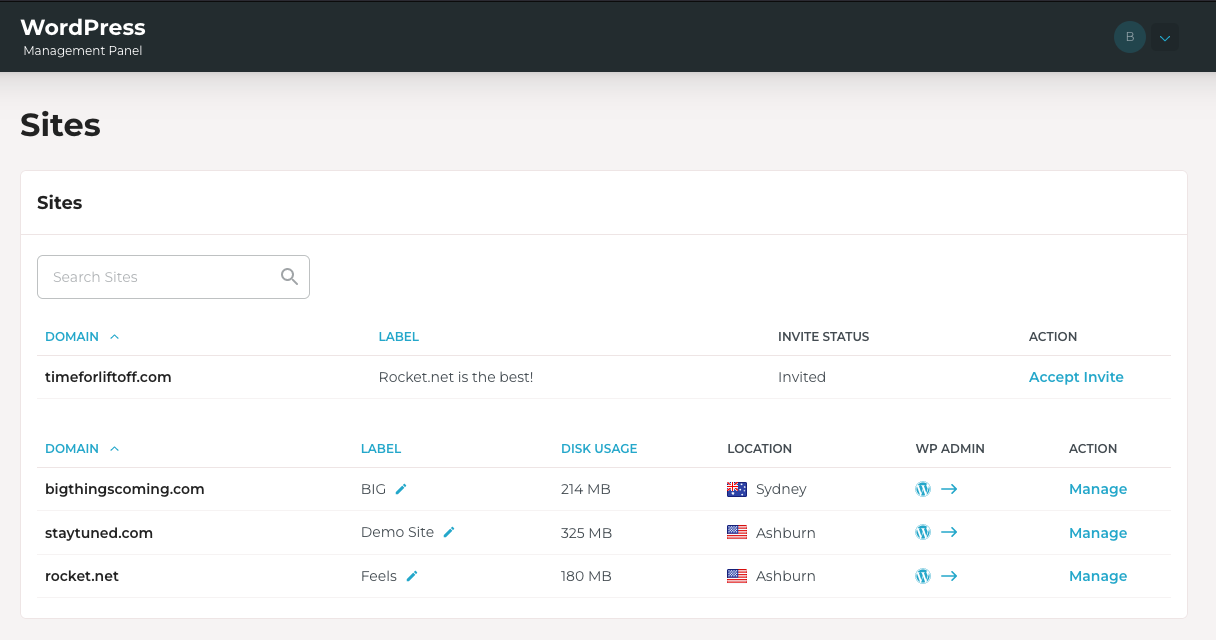
Namecheap employs both standard cPanel and a custom EasyWP dashboard, catering to a wide range of users. The traditional cPanel offers a familiar interface for those with technical experience, making access to site management tools straightforward. Alternatively, the EasyWP dashboard simplifies the process for non-technical users by providing a single, user-friendly interface integrating essential site management features. This makes it accessible to beginners and those preferring minimal complexity.
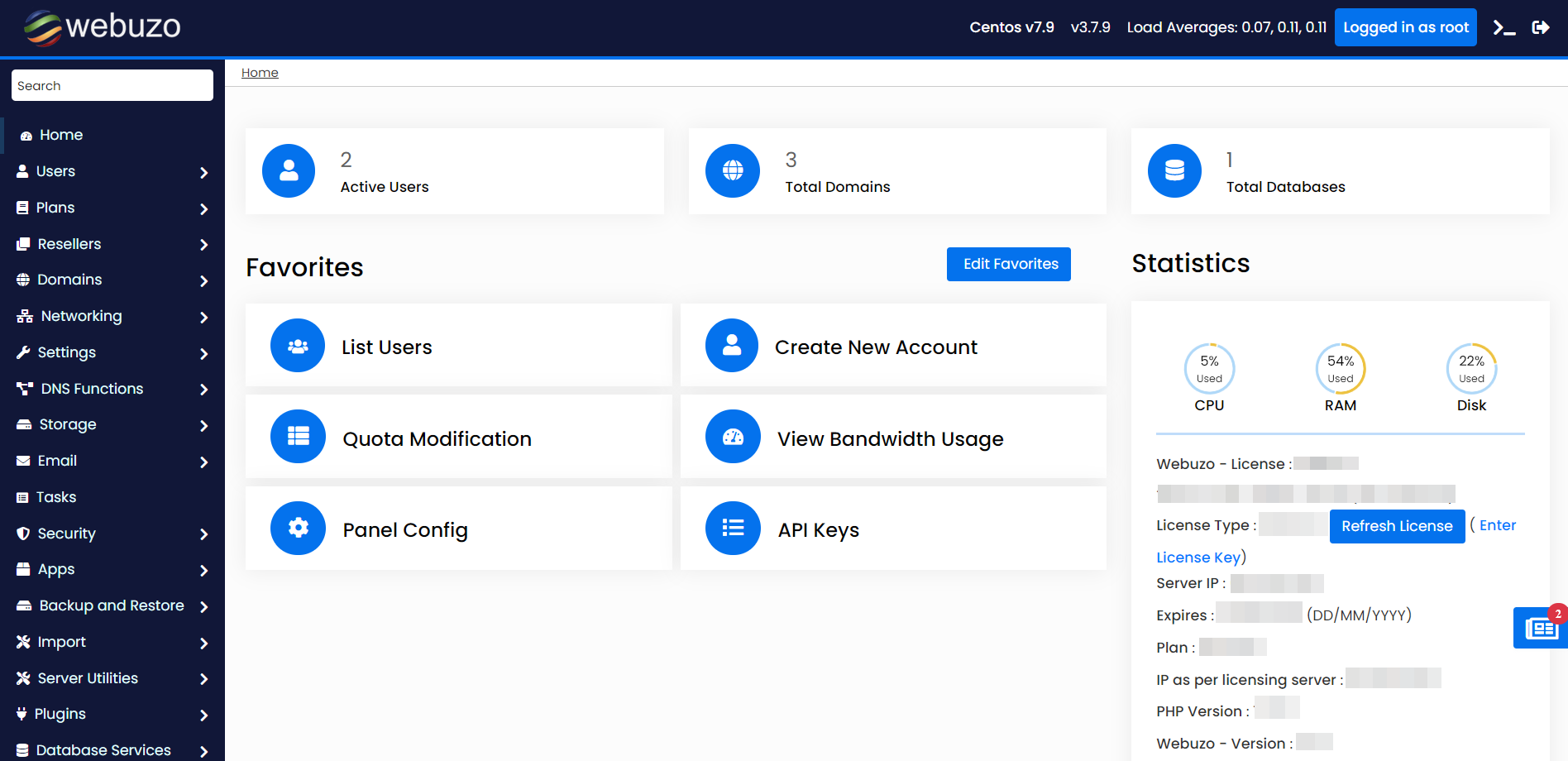
Both Namecheap and Rocket.net offer free migration services. Namecheap uses the All-in-One WP Migration plugin to transfer websites from a variety of hosts, ensuring compatibility and ease of transfer. Rocket.net offers unlimited free migrations and handles the entire process, guaranteeing zero downtime and service continuity. Both services ensure minimal user involvement, but Rocket.net’s emphasis on ensuring no downtime may provide additional peace of mind.
Namecheap and Rocket.net both excel in customer support and help center resources. Namecheap features 24/7 live chat, a comprehensive knowledge base, and a secure support ticket system. Their resources cover a wide range of topics, assisting users effectively. Rocket.net offers around-the-clock support via live chat, email, and phone, with an emphasis on instant response times. Their detailed analytics and comprehensive user management tools are powerful assets for users seeking thorough site insights.
User management
accessibility.
Score Components:
- Role customization (40%): Flexibility in creating and defining user roles and
permissions. - Ease of management (30%): User interface and tools for managing users.
- Access control (20%): Effectiveness of access control measures for different user
levels. - Scalability (10%): Ability to manage a growing number of users efficiently.
 0.0
0.0
 8.5
8.5
🏆 Winner Rocket.net: Comprehensive user management features for streamlined site management.
When comparing Namecheap and Rocket.net in managing user roles, permissions, and accessibility, it’s clear that Rocket.net offers more extensive capabilities. Rocket.net provides the ability for customers to create sub-users with selective access to specific WordPress sites. The flexibility to add unlimited users and manage access at the site level adds a significant advantage. In comparison, Namecheap lacks detailed information on these features, which suggests less flexibility in user role management and permissions.
Rocket.net’s user interface and tools for managing users stand out with their dedicated control panel. Users can reset passwords, add site-level users, and employ two-factor authentication for added security. The capability for sub-users to log in via a white-label control panel further enhances the user experience. The process of inviting users and allowing them to manage specific sites is straightforward and efficiently designed. In contrast, Namecheap’s user interface for managing roles is not detailed, indicating fewer specialized tools for user management.
Assessing access control measures, Rocket.net demonstrates effective methods to handle a growing number of users. Site-level access control and roaming profiles ensure that only authorized personnel manage designated sites. With SSH, (S)FTP access, and key-based authentication, Rocket.net’s platform is secure and scalable for expanding requirements. While Rocket.net includes numerous features like brute-force protection and a secure file manager, the lack of information about Namecheap’s capabilities in these areas raises concerns about its scalability and security in managing a growing number of users.
Rocket.net User Roles Table:
| Role | Description | Access Highlights |
|---|---|---|
| Site User | Manages access to specific WordPress sites. | Can view pending invites, manage accessible sites. |
Customer support
hosting provider.
Score Components:
- Support communication channels (30%): Measures the variety of customer support types
provided (live chat, chatbot, email, phone, etc.) - Availability (20%): Assesses the availability hours for each channel, including 24/7
support options. - Technical support quality (30%): Assesses whether the provider offers comprehensive
technical support, including hardware upgrades (e.g., HDD to SSD), software installations, and web
server configuration changes. - Enterprise support (20%): Checks if there are dedicated or priority support services
for enterprise-level customers.
 8.0
8.0
 9.2
9.2
🏆 Winner Rocket.net: Rocket.net provides fast and highly praised support across multiple channels, ensuring quick resolution times and specialized WordPress assistance.
 |
 |
|
|---|---|---|
Phone support |
||
Live chat support |
||
Chatbot |
||
Email/ticket support |
||
Enterprise support (dedicated agent, priority support) |
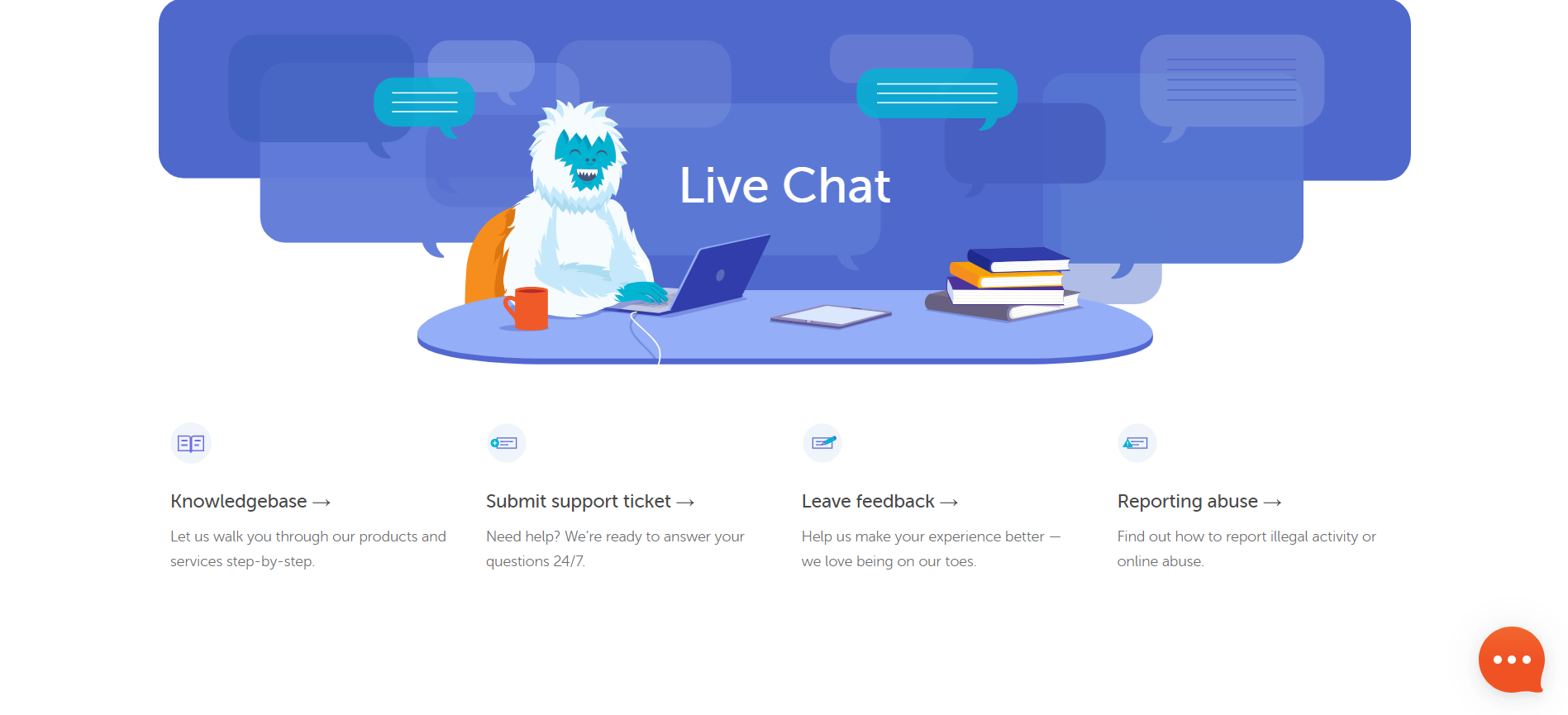
Rocket.net and Namecheap both offer 24/7 live chat and ticketing support, ensuring users can get help at any time. Rocket.net extends their support with phone assistance, which Namecheap lacks. This added support channel can be crucial for customers seeking prompt, personalized help.

Rocket.net’s live chat has a faster response time and additional support channels like a private Slack channel for enterprise customers. Meanwhile, Namecheap focuses on extensive self-help resources, like an in-depth knowledge base and how-to videos. Namecheap’s migration services are competitive, but Rocket.net’s unlimited free WordPress migrations increase its appeal for WordPress users.
Namecheap vs Rocket.net: User feedback
Namecheap is highly appreciated for its affordability, reliable web hosting, and excellent customer support, available 24/7 via live chat. Users commend the inclusion of free SSL certificates and quality cPanel features, making it ideal for beginners and small to medium-sized businesses. However, some dissatisfaction is noted with the shared hosting plans, which are reported to have slow loading speeds and stability issues. Additionally, there are occasional concerns about the complexity of the user interface and the lack of multilingual support.
Users highly praise Rocket.net for its superior support, user-friendly interface, and top-notch security features. The integration with Cloudflare Enterprise and the inclusion of an Enterprise CDN are standout benefits, saving users money and reducing the need for additional plugins. Customers appreciate the platform’s powerful features, including staging areas, manual backups, and integrated file management. While feedback is overwhelmingly positive, a minor suggestion includes the addition of more analytic tools.
Namecheap vs Rocket.net: FAQ
Which platform is better suited for hosting WordPress websites?
Rocket.net is better suited for hosting WordPress websites due to its enterprise-level infrastructure, globally distributed edge locations, and pre-configured settings optimized for WordPress. With faster response times and more advanced security features, Rocket.net offers superior performance and reliability compared to Namecheap, making it ideal for WordPress hosting.
Which hosting service offers better security features?
Rocket.net offers better security features with real-time malware protection powered by Imunify360, automated updates, and an Enterprise Web Application Firewall (WAF). Namecheap also provides robust security measures including ClamAV™ virus scanning and encryption options, but Rocket.net’s advanced security features and proactive fraud defenses significantly enhance website protection.
What are the major differences in pricing and value between namecheap and rocketnet?
Namecheap offers more economical hosting options with shared hosting plans starting as low as $1.98/month, making it a budget-friendly choice. Rocket.net starts at $30/month, focusing on high-traffic and enterprise-grade features. While Namecheap includes free SSL for the first year and is cost-effective, Rocket.net provides advanced performance and security features, justifying its higher price point for demanding users.
Which platform offers better customer support?
Rocket.net offers better customer support with 24/7 availability via live chat, email, and phone. Rocket.net also includes additional support channels like private Slack for enterprise customers, ensuring swift and specialized assistance. Namecheap, while providing extensive self-help resources and 24/7 live chat, lacks phone support, making Rocket.net’s customer support more comprehensive.
What are the differences in the control panels offered by each hosting service?
Namecheap uses both standard cPanel and a custom EasyWP dashboard, catering to diverse user needs with a familiar interface and simplified management. Rocket.net foregoes cPanel for a custom WordPress control panel, pre-configured for ease of use and integrating high-end features directly into the admin panel, making it more streamlined for WooCommerce and performance-focused sites.
The making of this blog
We followed a clear, step-by-step process to write and research this article.









